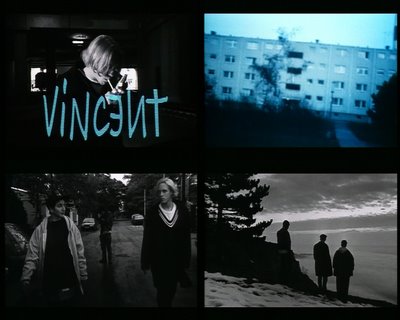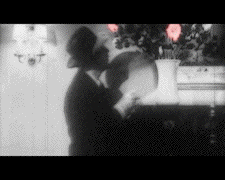Part 1 (posted yesterday)
• A Good Mix?
• "Getting Paid" Overviews
• "Open-Source" Overview
• Hype Or Real?
• Is YouTube A Dynamic Interactive Movie?
Part 2 (posted today)
• Alternatives To "Getting Paid"
• Collaborative Media Works
• Does It Matter…?
Alternatives To "Getting Paid"It remains to be seen if and how (and who) can make money directly with online video. At this moment most sites seem to favour ad-based business models. This raises the following questions:
Are we willing to watch (more) ads that pay for online video?Or, as an alternative to an ad-based model:
Are we willing to pay for online video content?Maybe it will be hard - for anyone - to make money directly (with any kind of) online media in the long run - maybe the content will (and should?) be free and money will be made with additional services/products...?Very interesting to me seem models like the one from
Have Money Will Vlog:
micro donations are raised for a particular project, the vlogger/film maker only receives the money if the project meets its goal.
While every film maker should get paid for his work
it makes a big difference if you make a movie because you want to make money with it
or because you feel passionate about a particular subject and also hope to make money with it.
And:
getting paid for your work is not the same as selling or licensing your work: the one who
gets paid is depending on someone to
be paid, but the one who
sells defines the value of his product and then
makes a deal with the one who buys...
Collaborative Media WorksWhile Wikipedia has shown that
text based, non-fiction mass collaboration does work, a true
(mass) collaborative film making process - specially for fiction works - seems less clear to me: can traditional movies be made this way?
One of the few solutions I can see for this in the short run is when we redefine what a movie is: then, as mentioned in
Part 1,
we could look at YouTube as a dynamic, interactive movie where everyone can view his own version and/or contribute to the "source footage". And to me this seems
not to be so much a
democratic process, but more an
anarchist-creative collaboration.
If you have ever tried to
develop a story with just one other person you know how hard this can be (and how well it can work if you find the right person). But this is even more difficult if a group of people tries to develop a
single story... And having dozens or even hundreds of people working on
one story -
without any limitations (like there being one person who makes a final
decision, a
limited number of possible
choices for character (sub)plots etc.) seems like a very difficult task to me.
A real life example: most of us can vote for a political party of their choice, but it would be very inconvenient if millions of people were to try to write
one single version of a national anthem!
Democracy, unfortunately,
has its limits when it comes to the practical sides of things. This is why we elect people who
take (final) decisions.
Another great
hindrance for story mass collaboration is the human ego: I somehow can imagine that if a large group of Buddhist monks was to develop a screenplay that this could actually work. But for most other people I think it would be very hard to reduce their egos to a level where mass collaborate on
one single story (with no character/plot limitations, no one who takes a final decision) is possible.
Still there are examples where mass collaboration for fiction did - and does - work well: fairy tales, folk songs, urban legends or jokes. The
Grimm Brothers only
collected (or "stole"?) stories that had been
told, developed and retold by many people over time. I think this was a true creative open-source process, maybe even more open-source than it could be today: some of these stories were only
told to one another - the
source was as free as it could possibly be and
over time the best version of a story was developed! (There really is an internal logic to every story - at first it might seem that there is an infinite number of possible outcomes for a particular event, but once you start working on a story the number of possible solutions becomes smaller and smaller...)
So these seem to be the conditions why the Grimm's Fairy tales could be developed:
• the
source was completely free - often it was
not even written down and you could participate just by listening/retelling it
• it seems like
no one claimed a copyright to a particular story
• the
process was not ego-driven (but you could still have "your" version)
•
time was
no problem (no deadline)
• but
in the end someone collected it, (re)wrote it (took decisions) and "branded" it ("Grimm's Fairy Tales")
So it looks like that
good conditions for true mass collaboration on fiction works are similar to those we find all around us in nature:
evolution!
Does It Matter...?It might sound harsh, but I think that the majority of people will
not care so much if a film is an open-source project, but
people will care about a film if they like it. (If Firefox was not a good (or great) browser would you still use it just because it is open-source...?)
And I think the same is true for sampling/remixing: people will
not remix a movie just because it has a
Creative Commons license (which many of us so strongly support) that would allow to produce a derivative work: YouTube has shown that
if a song needs to be lip-synched it will be lip-synched. And
if the latest Harry Potter movie needs to be recut to a particular song
it will be done.
What the open-source film movement needs is a hit: we need an open-source Harry Potter or Star Wars -
probably only then the masses will really start to appreciate the fact that they can remix a movie legally.
Also: let's never forget that
a good story is - and most probably
always will be - the one thing that makes people want to watch a movie ("If it’s not on the page, it’s not on the stage.").
Good stories are still written by individual writers, not by hundreds of people collaborating on one story at the same time (still many can collaborate on
different stories or different versions (maybe even aspects) of one story - and a
few could then make (undemocratic!)
decisions and bring it all together in one story).
I think that open-source film making and mass collaboration on fiction works have a great future, but
a good story remains vital and
not the most democratic process will automatically generate an open-source hit (the contrary might actually be the outcome).
Since we still live in a world restricted by copyright we might have to accept that
today the most successful instances where creative mass collaboration happens (YouTube lip-synching, remixes/mash-ups of Hollywood movies) is when people simply ignore the existing copyright laws and engage in a chaotic and anarchist (or call it "advanced democratic") creative process.
Nature, that came up with so many incredible "inventions", was
only able to this so well because in nature there are
no rights reserved:
nature just does not care about copyright...
Maybe millions of (young)
people just have to become "pirates" if they want to make 21st century art...? Or maybe there is
something wrong with our current copyright laws...? If so, how quickly can laws be adapted to the needs of our time...?
And:
how serious would millions of web users take their governments if they see that their
online communities already found answers to questions
that real life politicians never even asked...?
tags:
film,
video,
money,
opensource,
p2p,
filmmaking,
story,
storytelling,
collaboration,
copyright












